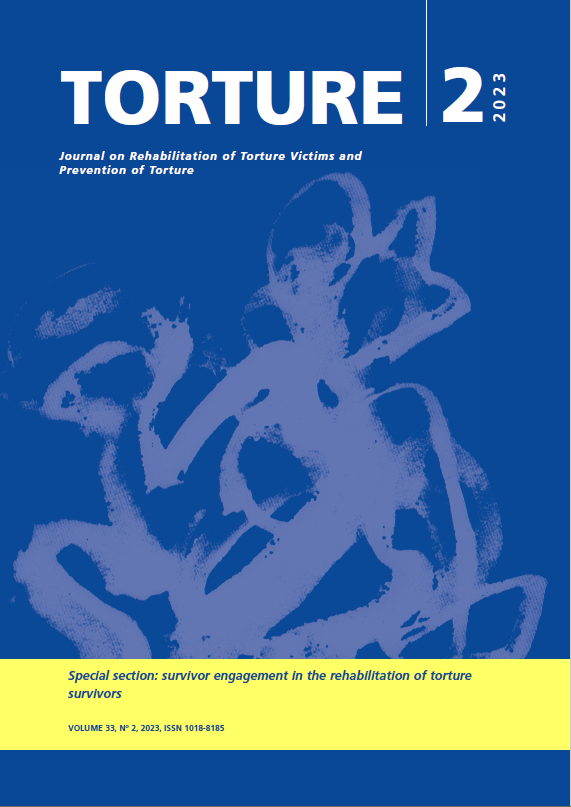The use of the Istanbul Protocol in Israel: Insights at the reception of the revised (2022) version
DOI:
https://doi.org/10.7146/torture.v33i2.136128Palabras clave:
documentation of torture, istanbul protocol, health professionals, interdisciplinary encounters, legal system, IsraelResumen
Health professionals and lawyers in Israel have used the Istanbul Protocol (IP), the internationally accepted protocol for documenting torture and ill-treatment, for many years (Abu Akar et al., 2014; Weishut, 2022; Weishut et al., 2023). A complete IP report requires substantial effort and investment of - mostly pro bono - experts, while the IP interview on which it is based is often an emotionally burdensome experience for clients. This paper presents insights about the use of the IP in Israel, as collected by a group of experts in the documentation of torture and ill-treatment, at the reception of the revised (2022) version.
Citas
Abu Akar, F., Arbel, R., Benninga, Z., Aboo Dia M., Steiner-Birmanns, B. (2014). The Istanbul Protocol (Manual on the Effective Investigation and Documentation of Torture and Other Cruel, Inhuman and Degrading Treatment): Implementation and Education in Israel. IMAJ, 16, 137-141.
Cohen, I., Gal, T., & Enosh, G. (2022). Two roads converge: The interchange between the mental health and legal discourses in sexual assault trials. Social & Legal Studies. https://doi.org/10.1177/09646639221117388
Koseoglu, Z. (2022). Launch of the revised version of the Istanbul Protocol. Torture Journal, 32(3), 89–89. https://doi.org/10.7146/TORTURE.V32I3.133934
Pérez-Sales, P. (2022). The 2022-revised version of the Istanbul Protocol: Orientation kit for people in rush. Torture Journal, 32(3), 3–15. https://doi.org/10.7146/torture.v32i3.133931
Public Committee Against Torture in Israel.Torture in Israel. (2023) Situation Report 2022. https://stoptorture.org.il/
Public Committee Against Torture in Israel & Israeli Medical Association (2014, February 25) Summary of Joint Seminar: The Istanbul Protocol in Israel. Unpublished manuscript.
Smith, O., & Skinner, T. (2017). How rape myths are used and challenged in rape and sexual assault trials. Social & Legal Studies, 26(4), 441–466. https://doi.org/10.1177/0964663916680130
Tracy, C. E., Fromson, T. L., Gentile Jong, J., & Whitman, C. (2012). Rape and sexual assault in the legal system. Paper presented to the National Research Council of the National Academies Panel on Measuring Rape and Sexual Assault in the Bureau of Justice Statistics Household Surveys Committee on National Statistics. Washington, D.C.
United Nations Office of the High Commissioner for Human Rights. (2022). Istanbul Protocol: Manual on the Effective Investigation and Documentation of Torture and Other Cruel, Inhuman or Degrading Treatment or Punishment. https://www.ohchr.org/en/publications/policy-and-methodological-publications/istanbul-protocol-manual-effective-0
Weishut, D. J. N. (2022). Participation of psychologists in Istanbul Protocol based physical examinations: An applied perspective. Torture Journal, 32(3), 65–70. https://doi.org/10.7146/TORTURE.V32I3.128792
Weishut, D. J. N., Aitchison, L. R., & Steiner-Birmanns, B. (2021). We need to teach human rights in medical schools. Torture Journal, 31(2), 147–148. https://doi.org/10.7146/torture.v31i2.128025
Weishut, D.J.N., Gurny, D., Rokach, R. & Steiner-Birmanns, B. (2023) Complexities of collaboration between physicians and mental health professionals in the assessment of torture victims. Manuscript submitted for publication.
Weishut, D.J.N. & Steiner-Birmanns, B. (2023) A review of reasons for inconsistencies in testimonies of torture victims. Manuscript in preparation.

Descargas
Publicado
Cómo citar
Número
Sección
Licencia
Derechos de autor 2023 Torture Journal

Esta obra está bajo una licencia internacional Creative Commons Atribución-NoComercial-SinDerivadas 4.0.
We accept that some authors (e.g. government employees in some countries) are unable to transfer copyright. The Creative Commons Licence Attribution-NonCommercial-NoDerivatives 4.0 International (CC BY-NC-ND 4.0) covers both the Torture Journal and the IRCT web site. The publisher will not put any limitation on the personal freedom of the author to use material contained in the paper in other works which may be published, provided that acknowledgement is made to the original place of publication.

